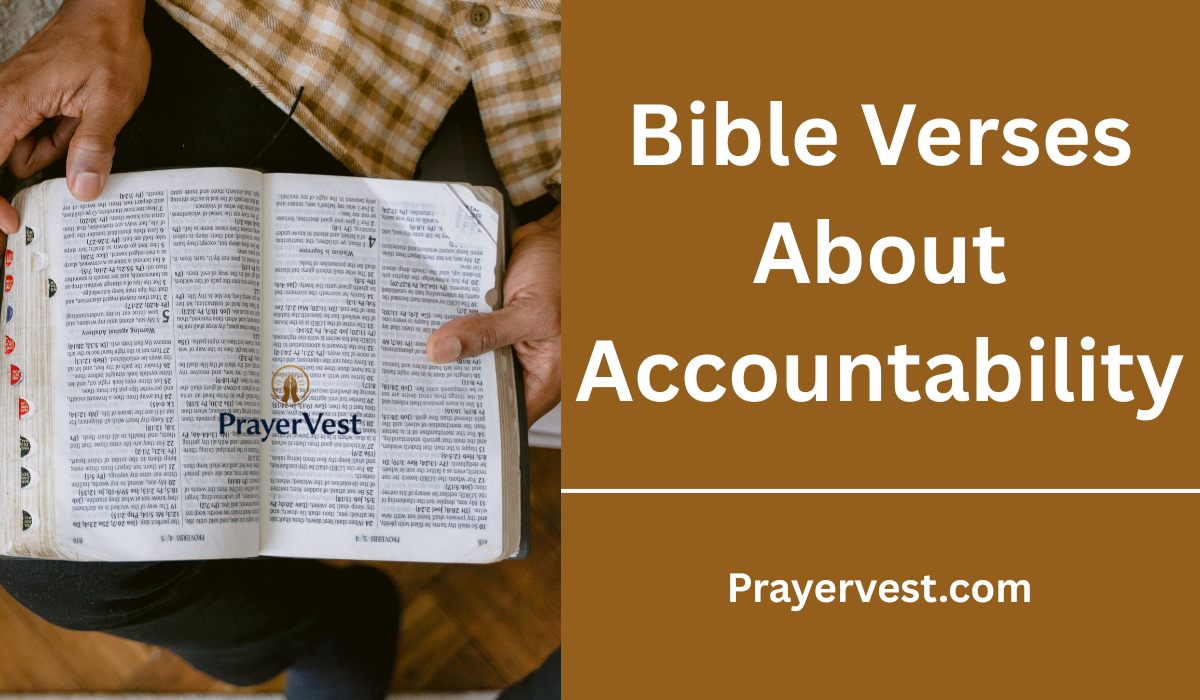A key component of both personal integrity and spiritual development is accountability. The Bible highlights the significance of being accountable to God and to one another in a world where deeds frequently go unrecognized or unappreciated. Accountability inspires Christians to live openly, seek holiness, and keep their word.
It is about encouraging development, self-control, and godly duty rather than condemnation or humiliation. Scripture serves as a reminder that our lives have eternal meaning and that our behavior matters to God as well as to other people.
The role of accountability in a believer’s life is clearly outlined in the Scriptures. The Bible emphasizes that no one is supposed to live alone, from the early instructions given to the Israelites to the cautions and encouragements in the New Testament.


Being accountable means surrounding ourselves with dependable mentors, other believers, and spiritual groups that can offer direction, correction, and support. We can see blind spots, withstand temptation, and maintain faithfulness in both our private and public lives because of these interactions.
Furthermore, stewardship of the abilities, opportunities, and duties that God has given us is intimately linked to accountability. We are more likely to act honorably, seek justice, and live in accordance with God’s Word when we are held accountable. Scriptures about accountability teach us that every decision has repercussions and that leading a purposefully responsible life fosters both interpersonal harmony and spiritual development. We learn how to live a purposeful life, help one another, and develop holiness by faithfully following God’s instructions as we examine these potent passages.
40 Powerful Bible Verses About Accountability (2026)
1. Romans 14:12
“So then, each of us will give an account of ourselves to God.”
Paul emphasizes personal responsibility before God, reminding believers that every action, choice, and decision carries weight. Accountability is ultimately to God, not merely to human judgment. This verse challenges us to live with integrity and intentionality, recognizing that our daily conduct matters in the divine perspective.
2. Galatians 6:4-5
“Each one should test their own actions. Then they can take pride in themselves alone, without comparing themselves to someone else, for each one should carry their own load.”
Paul encourages believers to examine their own conduct rather than judging others. Accountability is both personal and active—it requires self-reflection and responsibility. This verse teaches that while comparison is common, true growth comes from acknowledging our duties and ensuring we carry them faithfully.
3. James 5:16
“Therefore confess your sins to each other and pray for each other so that you may be healed. The prayer of a righteous person is powerful and effective.”
Accountability thrives in community. James highlights the healing power of mutual confession and intercession, demonstrating that openness and support within a godly community lead to restoration. Spiritual growth is strengthened when believers are willing to be transparent with trusted peers.
4. Proverbs 27:17
“As iron sharpens iron, so one person sharpens another.”
This proverb beautifully illustrates the reciprocal nature of accountability. Constructive feedback, encouragement, and challenge from others refine our character and wisdom. Spiritual and personal growth is not solitary but communal, shaped by those who challenge us to improve.
5. Hebrews 4:13
“Nothing in all creation is hidden from God’s sight. Everything is uncovered and laid bare before the eyes of him to whom we must give account.”
God’s omniscience ensures that no deed, thought, or motive escapes His notice. Accountability is inescapable because it is rooted in divine oversight. Understanding this reality encourages honesty, vigilance, and moral integrity.
6. Matthew 12:36
“But I tell you that everyone will have to give account on the day of judgment for every empty word they have spoken.”
Jesus reminds us that accountability includes our speech. Every word, even those that seem insignificant, carries weight before God. This verse calls believers to intentionality in communication, emphasizing that careless or harmful words have consequences.
7. 2 Corinthians 5:10
“For we must all appear before the judgment seat of Christ, so that each of us may receive what is due us for the things done while in the body, whether good or bad.”
Paul emphasizes that every believer will face a divine evaluation. Accountability is universal and impartial, ensuring that all actions—good or bad—are acknowledged and judged. This underscores the importance of living faithfully and responsibly.
8. Luke 16:2
“So he called him in and asked him, ‘What is this I hear about you? Give an account of your management, because you cannot be manager any longer.’”
Jesus tells the parable of the unjust steward to illustrate the principle of accountability in stewardship. Leaders and managers are responsible for how they handle resources, and neglect or dishonesty will not go unnoticed.
9. 1 Peter 4:5
“But they will have to give account to him who is ready to judge the living and the dead.”
Peter reminds believers that accountability is inevitable. Every action is observed, and justice will be served by God. This encourages moral responsibility, honesty, and awareness of divine oversight in all areas of life.
10. Proverbs 28:13
“Whoever conceals their sins does not prosper, but the one who confesses and renounces them finds mercy.”
Accountability involves acknowledgment and confession of wrongdoing. Hiding sin prevents growth and blessing, whereas transparency before God and others invites mercy and restoration.
11. Ecclesiastes 12:14
“For God will bring every deed into judgment, including every hidden thing, whether it is good or evil.”
Solomon emphasizes that no action is hidden from God. Accountability encompasses every thought, intention, and deed, reinforcing the need for integrity and conscientious living.
12. Colossians 3:23-24
“Whatever you do, work at it with all your heart, as working for the Lord, not for human masters, since you know that you will receive an inheritance from the Lord as a reward. It is the Lord Christ you are serving.”
Paul teaches that accountability is ultimately to God, not to human authorities. Excellence in every task is a reflection of responsibility and devotion, knowing that God observes our diligence and faithfulness.
13. 1 Corinthians 4:2-3
“Now it is required that those who have been given a trust must prove faithful. I care very little if I am judged by you or by any human court; indeed, I do not even judge myself.”
Paul highlights faithfulness as central to accountability. While human opinion may fluctuate, true accountability rests in how faithfully we manage what God entrusts to us.
14. Matthew 18:15-17
“If your brother or sister sins, go and point out their fault, just between the two of you. If they listen, you have won them over. But if they will not listen, take one or two others along, so that ‘every matter may be established by the testimony of two or three witnesses.’”
Jesus outlines accountability within the community of believers. Correcting wrongdoing should be done with love, fairness, and transparency, reinforcing mutual responsibility in spiritual life.
15. Proverbs 11:14
“For lack of guidance a nation falls, but victory is won through many advisers.”
Accountability is strengthened by counsel. Wisdom thrives when multiple perspectives provide oversight and guidance. Leaders and communities benefit from collective accountability in decision-making.
16. James 1:22
“Do not merely listen to the word, and so deceive yourselves. Do what it says.”
James emphasizes that accountability is not passive. Hearing God’s Word is insufficient unless it translates into action. True responsibility requires obedience and practical application of spiritual principles. This verse challenges believers to live out their faith consistently, knowing that neglecting action is a form of self-deception.
17. Proverbs 16:3
“Commit to the Lord whatever you do, and he will establish your plans.”
Accountability involves submission to divine authority. By entrusting our plans and actions to God, we align our intentions with His will. This not only ensures divine oversight but also positions us for success and blessing. Our accountability becomes a partnership with God, rather than a burden borne alone.
18. Matthew 25:14-30
Parable of the talents: “For to everyone who has, more will be given, and he will have an abundance. But from the one who has not, even what he has will be taken away.”
Jesus teaches accountability through stewardship. Each person is entrusted with resources, abilities, and opportunities, and will be evaluated based on their faithfulness. Neglect or misuse carries consequences, while diligent stewardship brings reward. Responsibility is both personal and spiritually significant.
19. 1 John 1:9
“If we confess our sins, he is faithful and just and will forgive us our sins and purify us from all unrighteousness.”
Accountability includes honesty before God. Confession is not simply an act of ritual but a conscious acceptance of responsibility for wrongdoing. God’s forgiveness and cleansing make accountability transformative, fostering growth, integrity, and moral renewal.
20. Luke 12:48
“From everyone who has been given much, much will be demanded; and from the one who has been entrusted with much, much more will be asked.”
Jesus stresses that responsibility is proportional to opportunity and resources. Greater privilege comes with higher expectations, highlighting the seriousness of accountability. This verse reminds believers that God’s blessings carry responsibilities that must be faithfully managed.
21. Proverbs 24:27
“Put your outdoor work in order and get your fields ready; after that, build your house.”
Accountability involves planning, prioritization, and responsible management. Solomon underscores that success depends on structured action and wise resource allocation. Personal and professional integrity is reflected in our ability to follow through with deliberate and careful planning.
22. Hebrews 13:17
“Have confidence in your leaders and submit to their authority, because they keep watch over you as those who must give an account.”
Accountability exists both ways in leadership. Leaders are responsible for the well-being and guidance of those under their care, while followers are called to trust and respect them. This mutual accountability fosters stability, order, and spiritual growth within communities.
23. Romans 3:19
“Now we know that whatever the law says, it says to those who are under the law, so that every mouth may be silenced and the whole world held accountable to God.”
Paul highlights that God’s law serves as a standard of accountability for all. Every individual is measured against divine principles, ensuring that no one can claim ignorance or avoid responsibility. Accountability is universal and impartial, guiding ethical and moral conduct.
24. 1 Corinthians 3:8-9
“The one who plants and the one who waters have one purpose, and each will be rewarded according to their own labor. For we are co-workers in God’s service.”
Paul illustrates accountability in collaboration. Every contribution matters, and God evaluates each person’s effort fairly. Spiritual and practical work is both personal and collective, emphasizing integrity, diligence, and shared responsibility.
25. Deuteronomy 32:35
“It is mine to avenge; I will repay. In due time their foot will slip; their day of disaster is near and their doom rushes upon them.”
God’s accountability ensures justice. While humans may struggle to enforce fairness, ultimate responsibility lies with God, who evaluates all actions. Believers are called to live righteously, trusting God to administer justice, while remaining mindful of their own accountability.
26. Proverbs 21:3
“To do what is right and just is more acceptable to the Lord than sacrifice.”
Accountability is demonstrated through righteous actions rather than mere ritual. God values integrity and justice over outward appearances or religious gestures. This verse teaches that our responsibility is to live in alignment with moral and ethical principles, making our conduct a reflection of true devotion.
27. Matthew 7:1-2
“Do not judge, or you too will be judged. For in the same way you judge others, you will be judged, and with the measure you use, it will be measured to you.”
Jesus teaches that accountability extends to how we treat others. Our judgment of others reflects the standard by which we ourselves will be held. This verse encourages humility, fairness, and self-examination in interpersonal relationships.
28. 2 Timothy 4:2
“Preach the word; be prepared in season and out of season; correct, rebuke and encourage—with great patience and careful instruction.”
Paul instructs Timothy on spiritual responsibility. Accountability in ministry involves diligence, patience, and faithfulness to God’s Word. Leaders and teachers are called to be vigilant and consistent, aware that their influence carries eternal significance.
29. Ezekiel 33:8
“When I say to a wicked person, ‘You will surely die,’ and you do not warn them or speak out to dissuade them from their evil ways in order to save their life, that wicked person will die for their sin, and I will hold you accountable for their blood.”
Ezekiel emphasizes moral responsibility within the community. Failing to guide or correct others when able constitutes a lapse in accountability. This verse underscores the importance of active engagement and concern for the welfare of others.
30. Proverbs 19:20
“Listen to advice and accept discipline, and at the end you will be counted among the wise.”
Accountability includes receptiveness to guidance. Wisdom grows when we submit to counsel and correction. By accepting constructive feedback, we fulfill our responsibility to learn and improve, avoiding unnecessary pitfalls caused by stubbornness or ignorance.
31. Romans 2:6-7
“God ‘will repay each person according to what they have done.’ To those who by persistence in doing good seek glory, honor and immortality, he will give eternal life.”
God’s ultimate evaluation is fair and thorough. Accountability is not merely punitive but also rewards diligent, righteous living. This verse inspires consistent effort in moral and spiritual disciplines, reinforcing that persistence in goodness is noticed and honored by God.
32. Galatians 6:7-8
“Do not be deceived: God cannot be mocked. A man reaps what he sows. Whoever sows to please their flesh, from the flesh will reap destruction; whoever sows to please the Spirit, from the Spirit will reap eternal life.”
Paul presents accountability in terms of cause and effect. Our choices yield corresponding consequences, spiritual or otherwise. Living responsibly requires deliberate attention to how our actions shape our future, emphasizing both personal and spiritual stewardship.
33. Matthew 18:21-22
“Then Peter came to Jesus and asked, ‘Lord, how many times shall I forgive my brother or sister who sins against me? Up to seven times?’ Jesus answered, ‘I tell you, not seven times, but seventy-seven times.’”
Accountability includes relational and moral dimensions. Believers are responsible for extending forgiveness and mercy. This teaching highlights the ongoing duty to maintain reconciliation and humility in interpersonal relationships.
34. Hebrews 12:11
“No discipline seems pleasant at the time, but painful. Later on, however, it produces a harvest of righteousness and peace for those who have been trained by it.”
Discipline is a key aspect of accountability. God’s corrective actions are intended to cultivate righteousness and inner peace. Enduring correction fosters growth and maturity, teaching us that accountability is both instructive and beneficial in the long term.
35. Colossians 3:25
“Anyone who does wrong will be repaid for their wrongs, and there is no favoritism.”
Accountability is impartial. God’s judgment treats all actions equally, leaving no room for partiality or excuse. This principle encourages fairness, ethical consistency, and personal responsibility in every action.
36. Psalm 139:23-24
“Search me, God, and know my heart; test me and know my anxious thoughts. See if there is any offensive way in me, and lead me in the way everlasting.”
David demonstrates self-accountability before God. Inviting divine examination cultivates awareness, correction, and growth. Accountability begins with honest self-assessment, acknowledging areas of weakness and seeking guidance toward improvement.
37. Luke 19:17
“Well done, my good servant! Because you have been trustworthy in a very small matter, take charge of ten cities.”
Jesus emphasizes faithful stewardship. Accountability rewards those who are trustworthy with small responsibilities, preparing them for greater duties. This principle reinforces the importance of diligence, integrity, and faithfulness in every task.
38. 1 Corinthians 9:27
“But I discipline my body and keep it under control, lest after preaching to others I myself should be disqualified.”
Paul highlights personal accountability in self-discipline. Leaders and believers alike are responsible for their conduct, ensuring that they live in accordance with the principles they teach. Integrity and consistency are vital for credibility and spiritual fruitfulness.
39. Ezekiel 18:20
“The one who sins is the one who will die. The child will not share the guilt of the parent, nor will the parent share the guilt of the child.”
Accountability is individual. God evaluates each person’s actions independently, emphasizing personal responsibility. This teaching clarifies that every individual must answer for their own choices, fostering awareness of ethical and spiritual duties.
40. 1 Thessalonians 5:21-22
“Test everything; hold on to what is good. Avoid every kind of evil.”
Paul instructs believers to exercise discernment and vigilance. Accountability requires both evaluation and adherence to what is right while rejecting evil. This verse encourages active responsibility in spiritual, moral, and practical decision-making.
Conclusion
Accountability is a useful framework for leading a life that honors God and improves our relationships with others, not just a spiritual idea. The Bible constantly reminds us that we are accountable to everyone around us as well as to God. By accepting responsibility, we develop honesty, humility, and discernment while letting God’s direction influence our choices and deeds. These verses encourage and challenge believers to reflect on their lives, seek sound counsel, and maintain faithfulness in all facets of their relationship with God.
In the end, leading an accountable life results in spiritual development and a closer relationship with God and the Christian community. We foster an atmosphere that is conducive to development and transformation when we voluntarily allow ourselves to be corrected, supported, and guided. By considering these passages, we are reminded that accountability is a divine call to live obediently, seek righteousness, and have a constructive influence on the world. By following this route, we align our hearts with God’s plan and help create a life that is characterized by obedience, purpose, and enduring spiritual fruit.






